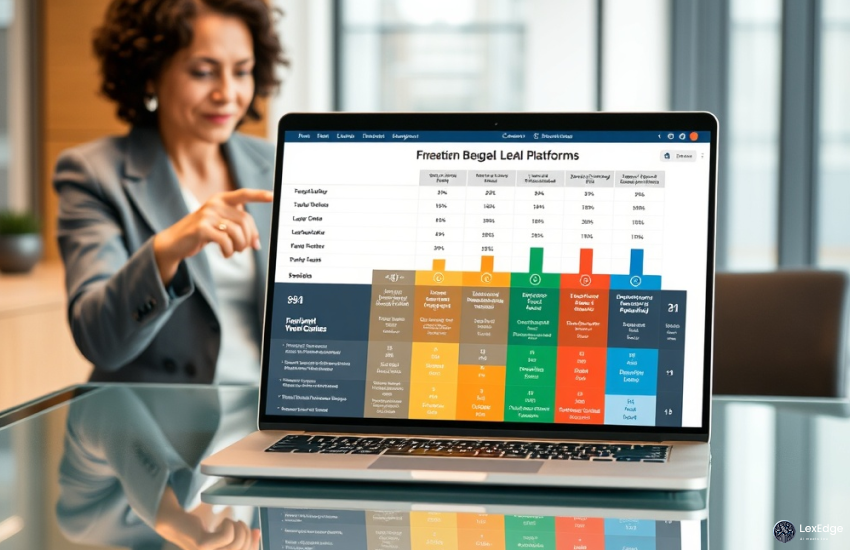The Transformative Impact of Legal AI Platforms

Legal AI platforms have evolved from simple document management systems to sophisticated tools powered by natural language processing (NLP) and large language models (LLMs). These platforms enhance legal workflows, from contract review and litigation support to in-house efficiency. Top AI platforms outperform traditional approaches in tasks such as document analysis and predictive legal insights. While challenges like data privacy, accuracy, and bias remain, emerging trends such as agentic workflows and human-AI collaboration are shaping the future of legal practice.
The Rise of Legal AI Origins and Context

The evolution of legal AI platforms has transformed law practice, starting from basic automation like document management and keyword search to advanced natural language processing (NLP) and large language models (LLMs). Today, these AI legal tools enable sophisticated document review systems and AI-powered legal research, enhancing efficiency, accuracy, and decision-making for law firms and in-house legal teams.
By integrating cutting-edge AI technology, modern legal technology solutions are redefining how legal professionals work and manage complex workflows.
Comparative Evaluation Core Ideas and Performance Benchmarks

When evaluating legal AI platforms and AI legal tools, several critical factors ensure efficiency, security, and value for law firms and in-house legal teams:
- Task Performance – Leading platforms like Harvey Assistant and CoCounsel outperform traditional lawyers in tasks such as document Q&A, summarization, and contract analysis, boosting productivity.
- Specialization – Some AI legal solutions focus on niche areas, addressing specific needs of law firm research, drafting, or in-house legal teams.
- Workflow Integration – Advanced tools seamlessly integrate with practice management software, streamlining administrative processes and automating routine legal tasks.
- Security and Compliance – Top legal AI platforms maintain robust data security standards and adhere to compliance regulations, safeguarding sensitive client information.
- Document Comparison and Analytics – AI-driven platforms offer rapid contract analysis, predictive insights, and historical data comparisons, enhancing decision-making and reducing manual workload.
Real-World Applications and Anecdotes

Legal AI platforms and AI legal tools are transforming law practice efficiency, accuracy, and decision-making across multiple areas:
- Contract Review – Tools like Kira help lawyers quickly identify risky clauses, streamline contract analysis, and improve overall review efficiency.
- Litigation Support – AI litigation platforms provide real-time trial assistance, highlight relevant case precedents, and support informed legal arguments.
- In-House Legal Efficiency – Platforms like LEGALFLY empower in-house teams to manage contract workflows, track approvals, and maintain compliance and data security.
Challenges and Considerations

Despite the benefits of legal AI platforms, several challenges must be considered:
- Accuracy and Reliability – AI systems may produce errors with serious consequences in legal document analysis and case evaluation.
- Data Privacy – Handling sensitive client and legal data requires strong security protocols and adherence to data protection regulations.
- Bias and Transparency – AI training data can introduce algorithmic bias, and lack of transparency in AI decisions may impact legal outcomes.
Emerging Trends and Future Possibilities

The future of legal AI platforms is shaped by innovative trends enhancing efficiency and collaboration in law practices:
- Agentic Workflows – Advanced AI agents can autonomously manage complex legal processes, improving productivity and reducing manual workloads.
- Human-AI Collaboration – AI is designed to augment lawyers’ expertise rather than replace them, enabling smarter decision-making and enhanced legal strategy.
- Predictive Analytics – AI platforms provide actionable insights from historical legal data to forecast outcomes and optimize workflows.
- Integrated Legal Tech – Seamless integration with practice management software and secure cloud systems enhances operational efficiency and compliance.
Conclusion
Legal AI platforms are redefining modern law by combining efficiency, accuracy, and predictive capabilities. Law firms and in-house teams can leverage AI for contract review, litigation support, and workflow automation while maintaining data security and compliance. Embracing collaboration between AI technology and human expertise is key to maximizing benefits. By adopting and evaluating the right legal AI tools, legal professionals can future-proof their practice and achieve operational excellence.

